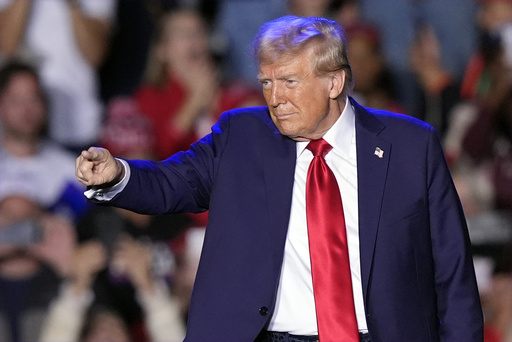
WASHINGTON — In the last four years, judges at the federal courthouse in Washington have dealt with numerous individuals involved in the riot at the U.S. Capitol, an event that represented a serious challenge to the American democratic process. With the upcoming presidential election on the horizon, there is rising apprehension among these judges regarding the potential for renewed political violence.
During a recent sentencing, U.S. District Judge Reggie Walton expressed his hopes that Americans would accept the outcome of next month’s election. However, he also conveyed his worries about the resurgence of conspiracy theories propagated by Donald Trump and his supporters, which contributed to the chaos of January 6, 2021.
“That sore loser is saying the same things he said before,” Walton noted, implying the inflammatory rhetoric that could incite further unrest. He warned that the potential for a similar situation or even a worse incident looms if discontent rises again.
Walton, who was appointed by President George W. Bush, shares these concerns with fellow judges who have recognized the current political environment as conducive to more violence. As Election Day approaches, many judges emphasize the importance of communicating a strong message that political violence will not be tolerated.
“I fear for what may occur if any faction feels disgruntled with the election results,” remarked Judge Jia Cobb, appointed by President Joe Biden, during the sentencing of several Capitol rioters last month.
Judge Rudolph Contreras also expressed concern over the potential for politically driven violence as he sentenced a man named Jeffrey Sabol, who participated in dragging an officer into a crowd of rioters. Sabol openly stated that he felt called to action during the riot, identifying himself as a “patriot warrior” answering the call of duty.
“It doesn’t take much imagination to foresee a similar call arising in the months ahead,” Contreras warned, raising alarms about the possibility of violence escalating further.
The former president has framed the revised narrative of the January 6 riot as a central theme in his campaign to reclaim the presidency, denying accountability for the actions of those who committed crimes during the disturbance.
Trump has said that if he regains the presidency, he would consider pardoning those involved in the riot, whom he refers to as “patriots.” He also claimed he would only accept the upcoming election results if the process is deemed “free and fair,” echoing his unfounded allegations from 2020.
Judges have taken it upon themselves to use their judicial platform to counter narrative efforts that minimize the severity of the January 6 violence. Some have raised concerns regarding the implications of this rhetoric for the future health of American democracy.
“We are in a challenging period in our nation, and I hope we can persevere,” Walton expressed during the sentencing of a nurse who had used medical scissors to damage a door at the Capitol.
Speaking on a personal level, Walton reflected, “I have a young daughter and a grandson; I want what’s best for the future of America. However, I question whether we can endure with the mindset observed on that day.”
To date, over 1,500 individuals have faced federal charges related to the events of January 6, with more than 1,000 convicted. Roughly 650 of these individuals have received prison sentences varying from a few days to 22 years.
Prosecutors in the Justice Department have repeatedly emphasized the need for stringent sentencing, arguing that such measures are essential to deter future politically charged violence.
“With the 2024 presidential election near and various influential figures in the media and online fanning the flames of division and distrust, the threat of January 6 repeating itself remains a significant concern,” prosecutors have cautioned.
Some rioters have displayed little remorse for their actions, with one individual who was the first to breach the Capitol saying, “I’ll go again given the opportunity.” Another rioter, part of the extremist group Proud Boys, bluntly told a judge, “You can give me 100 years, and I’d do it all over again.”
Recently, a woman known on social media as the “J6 praying grandma” avoided prison time after receiving a sentence that included home confinement. She attributed her actions to divine influence rather than political motivations.
“She has openly suggested she would participate again,” remarked prosecutor Terence Parker. Despite the prosecution seeking ten months in prison, the magistrate judge opted for six months of home confinement and a significant monetary penalty, emphasizing the urgent need to “lower the volume” ahead of the next election.
“External forces that seek to exacerbate division will not contribute positively to the country,” the judge indicated.
